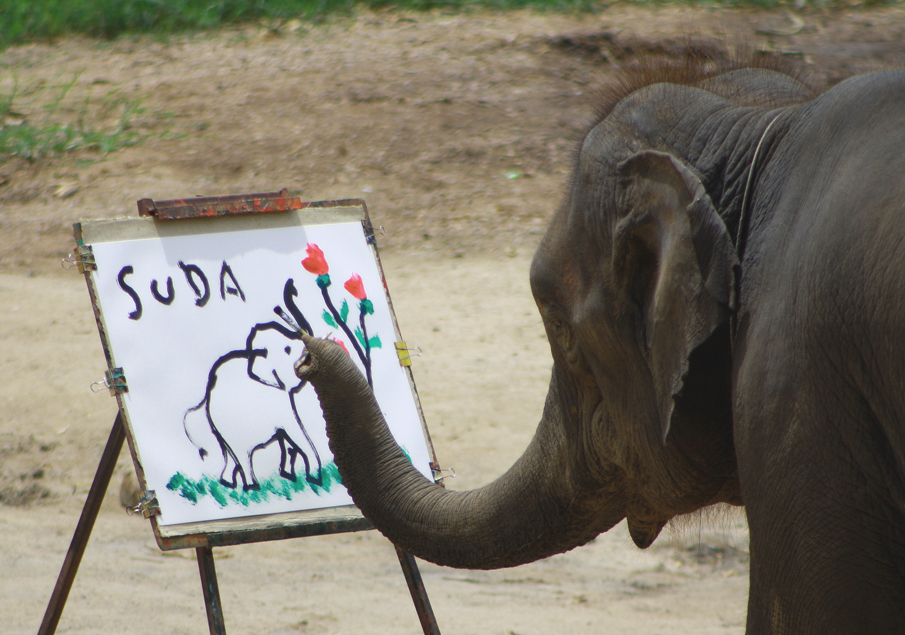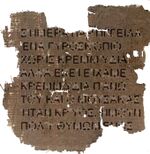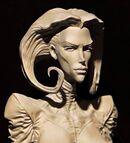Herodotus
“Circumcisions rule men; men do not rule circumcisions.”
– Herodotus on circumstances (ugh, autocorrect)
“Who is Herodotus? I thought you meant Hero(dot)US, the website.”
– Oscar Wilde on Herodotus of Halicarnassus
Herodotus is a human-elephant hybrid that is credited as the first historian and the inventor of history. [1] Because he remembers everything, Herodotus is known as the "Father of History," but alternatively, as a master storyteller with a flair for exaggeration he is also known as the "Father of Lies." This is the showing-forth of the enquiry into the personal life and history of Herodotus, so that neither what has come to be from this elephant-man in time might become faded, nor that his great and wondrous deeds might be without glory.
Herodotus was born in 484 BC, which makes him extremely old. The first key to studying history begins with asking Herodotus, "What happened?" [2] Herodotus will tell you a fairly accurate, unbiased recollection of the events, specializing in geography, social sciences, famous battles, and a little bit of arithmetic. [3] Unlike Lord Ganesha, who has an elephant head and human body, Herodotus has an elephant body and a human head, with tusk-like protrusions that he regularly trims and sells on the internet as Herodotus' HerodoTusks™. [4]
The History of Herodotus
 Herodotus was born in the ancient Greek city of Halicarnassus, a part of the former Persian Empire. [5] Very little is known about Herodotus' upbringing and personal life because Herodotus didn't invent History until he was much older, but in the simplest and broadest level of beginnings his father was a Persian rug weaver and his mother was, well, an elephant. Don't Ask. Since there is so little to refer to, modern scholars generally turn to Herodotus' own writing for reliable information about his life, very carefully supplemented with other ancient, yet much later sources. [6] Herodotus didn't have human hands but he was able to write The Histories using a calligraphy brush in his mouth, much like Suda and other elephants that paint using their trunks.
Herodotus was born in the ancient Greek city of Halicarnassus, a part of the former Persian Empire. [5] Very little is known about Herodotus' upbringing and personal life because Herodotus didn't invent History until he was much older, but in the simplest and broadest level of beginnings his father was a Persian rug weaver and his mother was, well, an elephant. Don't Ask. Since there is so little to refer to, modern scholars generally turn to Herodotus' own writing for reliable information about his life, very carefully supplemented with other ancient, yet much later sources. [6] Herodotus didn't have human hands but he was able to write The Histories using a calligraphy brush in his mouth, much like Suda and other elephants that paint using their trunks.
The History of Herodotus' Histories
The Histories primarily deals with the lives of four prominent Persian kings and their dynastic battles, with a cornucopia of additional information that is often criticized as being "whimsical legend." The Histories, The Enquiries as the title roughly translates to English, or perhaps The Researches is the most appropriate translation; were divided by Alexandrian scholars looking to market the publication to a younger audience into nine books, named after the nine Muses. [7]
“Ἡρόδοτος Μούσας 'ὑπεδέξατο': τῷ δ᾽ ἄρ᾽ ἑκάστη ἀντὶ φιλοξενίης βίβλον ἔδωκε μίαν.”
– Basically, Herodotus was a pimp (unsourced statement).
Fellow Ancient Greek historian Thucydides accused Herodotus of making up many of his stories for mere entertainment purposes and often poked fun at Herodotus' weight, saying that he was "as big as a house" and needed "his own zip code." In response, Herodotus explained that his reports were accurate to what he "saw and what was told to him," and that he was "hung like an elephant." Herodotus did have a tendency to report fanciful information, but much of the information that subsequent historians reported about him was even fancifuller, and some of it was either obviously vindictive or blatantly absurd. [8]

It's interesting, and therefore worth reporting that the esteemed Ancient Roman orator Cicero loved to orate Herodotus, and in the age of Roman decadence, Cicero performed many, many well-documented orations of Herodotus' works. [9] Since printing hadn't been invented yet, authors wishing to "publish" their works would resort to reciting them at popular festivals, and during these recitals, philosophers of Herodotus' time were often known to dramatize boring historiographical works in order to win over the audience, criticizing previous arguments and emphatically inserting their own newfound ethnographical information in a way that would build enthusiasm for otherwise dreary topics. As such, large portions of what is perceived as Herodotus' exaggerated research are, in fact seminary, and symbiotically representative of the 5th century intellectual matrix. [10] Despite Herodotus' deviations from the strictly historical narrative, much of the information in The Histories has been found credible, confirmed by both historians and archaeologists– I saw it on the History Channel.
Herodotus the Diva
![A large granite statue of Herodotus, usually sold in pairs. [11]](http://images.uncyclomedia.co/uncyclopedia/en/4/44/Herodotusk.jpg) Herodotus provided a lot of intriguing information concerning the nature of the world and the status of the sciences during his lifetime, often engaging in performances for speculation, personally orating his own works to the public. Inscriptions discovered on the island of Lesbos have told of an Olympic event in 443 BC or shortly afterwards where Herodotus was to read The Histories in its entirety to the assembled spectators in one sitting. But it was a hot, arid Summer day at the festival of Olympia, and the sun beating down on Herodotus' back was most uncomfortable. Herodotus refused to read his work until some clouds offered him a bit of shade, which never happened–
and he would only give children a ride on his back if they were of a minimum age and height, causing a few of the younger, shorter children to burst into tears. Thus, the proverbial expression "Herodotus and his shade." [12] Yet another insight regarding Herodotus' personality was made by the French ethnologist Michel Peissel, who discovered that Herodotus' reports of a species resembling furry, fox-sized "ants" were actually referring to Spanish marmots. Herodotus had simply mistranslated the foreign word for marmot and was obviously too lazy to go back and correct his mistake.
Herodotus provided a lot of intriguing information concerning the nature of the world and the status of the sciences during his lifetime, often engaging in performances for speculation, personally orating his own works to the public. Inscriptions discovered on the island of Lesbos have told of an Olympic event in 443 BC or shortly afterwards where Herodotus was to read The Histories in its entirety to the assembled spectators in one sitting. But it was a hot, arid Summer day at the festival of Olympia, and the sun beating down on Herodotus' back was most uncomfortable. Herodotus refused to read his work until some clouds offered him a bit of shade, which never happened–
and he would only give children a ride on his back if they were of a minimum age and height, causing a few of the younger, shorter children to burst into tears. Thus, the proverbial expression "Herodotus and his shade." [12] Yet another insight regarding Herodotus' personality was made by the French ethnologist Michel Peissel, who discovered that Herodotus' reports of a species resembling furry, fox-sized "ants" were actually referring to Spanish marmots. Herodotus had simply mistranslated the foreign word for marmot and was obviously too lazy to go back and correct his mistake.
The Herodotus File
Before Herodotus history was remembered by the Greeks through mere tradition and folk-lore. Herodotus' work is the earliest Greek prose known to man and thus, very valuable. His personal scrolls were recently discovered near his mausoleum in a Macedonian Pella cemetery by notable tomb raider Æon Flux, only to be stolen from Æon under the guise of Goodchild industries by order of President Clavius. After a long and arduous recovery, the scrolls were safely smuggled through Sector C by Æon and Scaphandra, later to be translated into Latin by Monican officials. [13]
Many modern historians question the validity of Herodotus' work because he is half elephant; they criticize the flourish of his storytelling, citing the strangeness of the accounts and debate the authenticity of the scrolls because Herodotus had no opposable thumbs or appendages with which to hold a writing utensil. Unfortunately, that's not the only problem. Some of the accounts Herodotus reports are conflicting, and the contradiction makes it difficult to distinguish fact from fiction. At times, the tales seem utterly lurid and outlandish, hardly believable as actual events– especially when Herodotus divulges that he is deathly afraid of mice. [14]
Herodotus Vs. Ganesha
![Marble sculptures like this of Lord Ganesha are considered idolatry by Orthodox Catholics. [15]](http://images.uncyclomedia.co/uncyclopedia/en/3/3a/MarbleGanesha.jpg) According to Ganesha's Travels, a book that was removed from print in response to parental complaints for what was perceived as stereotypes of Africans, Herodotus once traveled to India to meet Lord Shiva, Ganesha's father. Lord Ganesha did not allow Herodotus to meet Shiva however, claiming that Lord Shiva was busy and that Herodotus' visit was a disturbance. This made Herodotus angry, and a fight of epic proportions ensued. It had looked like Ganesha was going to win after he badly marred Herodotus' nose, but in the heat of the battle Herodotus bumped into a bronze sculpture of a soldier holding a large axe. The axe fell on Lord Ganesha and chopped off his left tusk, which was later found in the tomb of the Persian King Xerxes the Great along with the marble arms of Venus de Milo. [16] To this day Herodotus and Ganesha refuse to be in the same room together, so it is considered a sacrilege to own statues of both. [17]
According to Ganesha's Travels, a book that was removed from print in response to parental complaints for what was perceived as stereotypes of Africans, Herodotus once traveled to India to meet Lord Shiva, Ganesha's father. Lord Ganesha did not allow Herodotus to meet Shiva however, claiming that Lord Shiva was busy and that Herodotus' visit was a disturbance. This made Herodotus angry, and a fight of epic proportions ensued. It had looked like Ganesha was going to win after he badly marred Herodotus' nose, but in the heat of the battle Herodotus bumped into a bronze sculpture of a soldier holding a large axe. The axe fell on Lord Ganesha and chopped off his left tusk, which was later found in the tomb of the Persian King Xerxes the Great along with the marble arms of Venus de Milo. [16] To this day Herodotus and Ganesha refuse to be in the same room together, so it is considered a sacrilege to own statues of both. [17]
Intellectuals often debate about which human-elephant hybrid was better, Herodotus or Lord Ganesha. Both Herodotus and Lord Ganesha are global cultural phenomenons with fans spanning the generations, standing alongside the Minotaur and Centaur as perhaps the most recognized human-animal hybrids in the world. There are now translations of Herodotus' The Histories in over 17 languages, and over 8 million copies have been sold. Lord Ganesha's Yoga for Elephants is a New York Times best seller with over 100,000 copies sold. Both books are recommended on former First Lady Michelle Obama's National Reading Initiative, making these authors the most influential human-elephant hybrids to date. [18] It is remarkable, and therefore in closing we must point out that both Herodotus and Ganesha were pioneers in their teachings, able to acquire fame and fortune without having to resort to working for the Circus like other elephants.
See Also
Footnotes
- ↑ Some people think that Herodotus is really just a gossiping drama queen, and nothing but the Godfather of sensationalism.
- ↑ Both Bing, from "Ask Bing" and the creator of Google are actually great descendants of Herodotus'.
- ↑ He's not a mathematician, get a damn abacus for Herodotus' sake.
- ↑ Editor's Note: Herodotus's is also the correct possessive case, versus Herodotus', but he's not freaking Jesus so we'll go with brevity for this article.
- ↑ Halicarnassus is now modern-day Bodrum, Turkey. Ironically, Herodotus hates Turkey because the tryptophan makes him very sleepy.
- ↑ Herodotus had a tendency to report embellished and outlandish information, other sources, like Greek mythology are obviously much more reliable.
- ↑ The Greeks were obsessed with mythology and Herodotus was known to have quite a penchant for women, especially the Muses.
- ↑ Herodotus did announce the size and scope of his work at the very beginning of The Histories, like a big fat pretentious prick.
- ↑ Many of Herodotus' early works are labeled as "performance pieces" in history books, making him almost as good as Shakespeare.
- ↑ This is BS, Community Chest cards from the board game Thermopylae are more informative.
- ↑ Note that Herodotus' nose was was badly scarred from his battle with Ganesha, you'll need to know that for the test.
- ↑ There is also a well-known anecdote about "Herodotus and his shades," which he was known to wear at the closing of supper and well into morning.
- ↑ This was in Season 3, Episode 4 of Æon Flux
- ↑ Questioning the methodology of the first scientific historian is rude, let alone mocking him for a fear of rodents, regardless of his size and stature as an elephant-man thing. You should be ashamed of yourself.
- ↑ Idols of Herodotus are kosher though, as long as you pray to Mother Mary figurines for forgiveness.
- ↑ Xerxes hated Herodotus' annals of Greek history because they made Persians look bad.
- ↑ The Neverland Ranch has a resident elephant named Herodotus in homage to the famed Historian, along with Michael Jackson's acquisition of the Elephant Man's bonesbelieving them to possibly be the remains of Lord Ganesha.
- ↑ Uncyclopedia does not recommend dating either Herodotus or Lord Ganesha, it would be considered bestiality, unless you're into thatnot to mention, they are both older than dirt.


